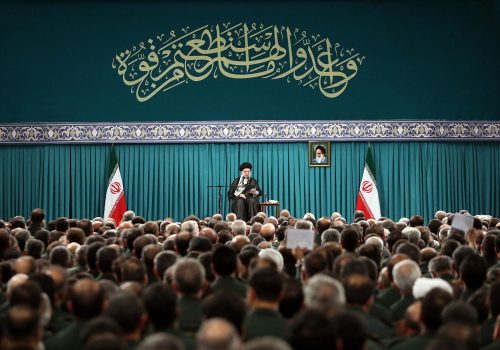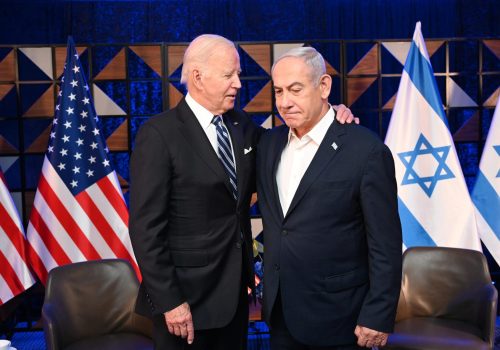Six steps to disrupt Hamas and other terrorist groups’ finances
Just over thirty-eight years ago, on October 8, 1985, the modern American struggle against terrorism financing began. On that tragic day, terrorists from the Palestine Liberation Organization summarily executed an American hostage, Leon Klinghoffer, a sixty-nine-year-old, wheelchair-bound entrepreneur and World War II veteran on vacation celebrating his wedding anniversary with his wife. The terrorists subsequently dumped his corpse overboard on the hijacked Achille Lauro cruise ship. This horrific tragedy led to the eventual passage of the Anti-Terrorism Act of 1990, which for the first time provided a legal cause of action for American terrorism victims to seek justice for acts of international terrorism. Since then, the United States has continued to refine its financial toolkit to go after terrorist organizations and their financial enablers through a variety of civil and criminal legal tools.
In its October 7 attack on Israel, Hamas and other terrorist groups killed more than 1,400 people and took at least 222 hostages. Among the dead are at least thirty-two Americans, making it the deadliest foreign terrorist attack against Americans since 9/11.
The United States must again learn from tragedy. The US government has an opportunity to use its robust financial authorities to disrupt Hamas’s tactical financial capabilities. To do so, it must implement structural changes to strengthen both US and partner capabilities to combat terrorism financing and other illicit finance threats in the Middle East and beyond.
Below are six steps that the US government—Congress and the Justice, State, and Treasury departments—should take now to address terrorism financing risks.
1. Formalize and resource a Treasury Department foreign financial service
Congress should create and fund a foreign financial service (FFS) that builds on the existing financial attaché program codified under Section 6106 of the Anti-Money Laundering Act of 2020. Modeled on the State, Commerce, and Agriculture departments’ foreign services, this FFS would provide the Treasury Department with the institutional resources, personnel, and capabilities to more effectively represent US economic interests to allies, partners, and adversaries around the world, especially to counter illicit finance threats such as terrorism financing. A formalized and funded FFS would allow the United States to expand its technical capabilities to more global and regional financial centers, as well as to economic crisis hot spots.
Congress made an important stride with Section 6106, but it only authorized a small expansion of the program to appoint six additional attachés and, critically, without appropriating a budget for those positions. Congress now needs to fund the program, including for dedicated headquarters personnel to sustain a professional program, which means providing the resources needed to recruit, train, retain, and promote a financial diplomatic corps. For instance, in part due to limited resources, the Treasury Department withdrew financial attachés from Ukraine and Turkey over the past several years, only recently to return personnel to Turkey on a temporary basis. Deploying financial attachés on a temporary basis has higher unit costs than permanent placements at a given embassy and should only be used in unforeseen crisis situations or to provide surge capabilities to existing embassy offices. The value of a financial attaché is in large part the continuity and relationship management with stakeholders that comes from a sustained in-country presence during periods of relative calm that can then be leveraged in times of crisis. In the Middle East, the Treasury Department has recently closed its office at the US embassy in Qatar. And a financial attaché was previously stationed in Jerusalem, but the department closed that office a decade ago.
2. Deploy Treasury Department financial attachés to Israel and Qatar
Establishing a FFS will take time to design and launch. In the interim, to strengthen US support for allies and combat terrorism financing, sanctions evasion, and other forms of illicit finance in the region, the Treasury Department should deploy a financial attaché to work out of the US Embassy in Jerusalem with responsibilities at least for Israel and the Palestinian territories. Former Treasury Secretary Jacob Lew, the current nominee to serve as the US Ambassador to Israel, is intimately acquainted with the financial attaché program and the value of Treasury Department expertise at home and abroad, so the department’s capabilities can be immediately leveraged.
The Treasury Department should also work expeditiously to reopen its office at the US Embassy in Doha, which closed this year. A financial attaché stationed in Doha may not have prevented the roiling controversy over the six billion dollars in Iranian oil revenues that remain in limbo, but the absence of an in-country Treasury Department presence removed a critical expert interlocutor between the US and Qatari governments, likely exacerbating an already fragile diplomatic and economic issue. The Treasury Department should also make use of its existing network of financial attachés in the region, including through the Terrorist Financing Targeting Center (TFTC) platform based in Riyadh, Saudi Arabia, to share information about terrorist financing networks, coordinate joint disruptive actions, and offer capacity-building training and assistance in countering the financing of terrorism. Treasury Department Under Secretary for Terrorism and Financial Intelligence Brian Nelson’s October 23-26 visit to Saudi Arabia to chair a TFTC meeting is an important step that will require sustained high-level engagement, including through regional financial attachés.
3. Strengthen the global regulatory framework on digital assets
Hamas’s terror attacks brought renewed attention on the organization’s use of digital assets to raise and move money. On October 18, the Treasury Department’s Office of Foreign Assets Control sanctioned ten Hamas members, operatives, and financial facilitators. The designations package included a Gazan cryptocurrency company, Buy Cash Money and Money Transfer Company, representing the first targeting of a Gazan cryptocurrency exchange. The Treasury Department press release, a bipartisan, bicameral letter to Treasury and the White House, and public reporting demonstrated how Hamas exploits digital assets for raising and moving funds. On October 19, the Treasury Department’s Financial Crimes Enforcement Network (FinCEN), its Financial Intelligence Unit, issued a Notice of Proposed Rule Making under Section 311 of the USA PATRIOT Act to enhance transparency of convertible virtual currency mixing and combat terrorist financing, including risks related to Hamas and Palestinian Islamic Jihad.
According to the Treasury’s 2022 National Terrorist Financing Risk Assessment, certain digital assets “may also be vulnerable to abuse by terrorist financiers because they can enable anonymous cross-border peer-to-peer funds transfers, which can occur without the involvement of a [virtual asset service provider] with [anti-money laundering] obligations.” The Treasury Department should prioritize regional compliance with international standards through the Financial Action Task Force (FATF) and its FATF-style regional body, the Middle East and North Africa Financial Action Task Force.
4. Surge Joint Terrorism Task Forces to target financial networks
Operating since 1980 and expanding in scope and importance after the 9/11 attacks, the Joint Terrorism Task Forces (JTTFs) have a nationwide footprint of two hundred task forces across all fifty-six Federal Bureau of Investigation (FBI) field offices. They are made up of law enforcement and intelligence professionals comprising hundreds of local, state, and federal agencies. Attorney General Merrick Garland announced important recent measures on October 12, including to help those Americans directly impacted by this horrific Hamas terror attack, but more elements of US justice enterprise can be used to address the threat in the current moment.
5. Convene public-private FinCEN Exchange meetings
The Treasury Department’s FinCEN should work with relevant law enforcement agencies, including through certain JTTFs, to convene a series of public-private FinCEN Exchange meetings on the current terrorist financing risk. Given ongoing concerns about the role of cryptocurrencies in fundraising for Hamas and other terrorist groups, FinCEN should consider including responsible cryptocurrency exchanges, blockchain analytics companies, and other technology companies. It should also work with foreign partners through their respective public-private information sharing platforms.
FinCEN has a demonstrated track record over several years of engaging with digital asset companies on other priority issues, such as ransomware and North Korean malign activities, as well as developing creative partnerships to combat the fentanyl crisis. FinCEN Director Andrea Gacki’s October 18 virtual meeting with her Israeli counterpart on financial intelligence information sharing is an important first step, but FinCEN can take further action in this area to counter terrorism financing. As an added measure, the Treasury Department should also consider targeted intelligence sharing with European and other key partners to strengthen their domestic regimes against Hamas financing.
6. Add Hamas hostage takers to the State Department Rewards for Justice program
The State Department’s Rewards for Justice program is a powerful initiative to incentivize whistleblowers around the world to support US national security and foreign policy interests. Adding hostage recovery authorities to the Rewards for Justice program would allow the State Department to pay whistleblowers who provide information that leads to the recovery of American hostages. While the Hamas terrorists responsible for the hostage taking of American citizens are not likely motivated by money, others within the Gaza Strip may have information to aid in returning US citizens.
While these recommendations will not alone solve what is inherently a military and political conflict, they can support US foreign policy and national security efforts to counter terrorism financing by making it more costly, inefficient, and risky for terrorist financiers to raise, move, invest, and spend money.
After nearly forty years since Klinghoffer’s brutal murder at the hands of the Palestine Liberation Organization and less than a month since the worst foreign terrorist act committed against American citizens since 9/11, the US government should use all available tools of national power to protect the United States and its allies, work toward the recovery of American and partner hostages, and degrade terrorist groups’ financial capabilities.
Alex Zerden is the founder of Capitol Peak Strategies, a risk advisory firm, an adjunct senior fellow at the Center for a New American Security, and a former Treasury Department financial attaché. You can follow him on X at @AlexZerden.
Further reading
Mon, Oct 23, 2023
Live expertise: The latest insight as the Israel-Hamas war intensifies
New Atlanticist By
Atlantic Council experts are analyzing the Israel-Hamas conflict as it enters its third week.
Tue, Oct 24, 2023
The legal challenges in holding Iran accountable for supporting Hamas
New Atlanticist By C. Anthony Pfaff
Under current international law, a state actor may only be responsible for the actions of a proxy if it directs the proxy to take those actions or knows that the provided material would be used to commit certain crimes.
Wed, Oct 18, 2023
The Israel visit was just the start. Here’s what Biden needs to do next.
New Atlanticist By William F. Wechsler
The US and Israel should develop and publicly issue a joint set of common principles that will guide the future of Gaza, once Israel’s full military objectives against Hamas are reached.
Image: Palestinian Hamas militants attend an anti-Israel rally in Khan Younis, in the southern Gaza Strip May 27, 2021. REUTERS/Ibraheem Abu Mustafa


